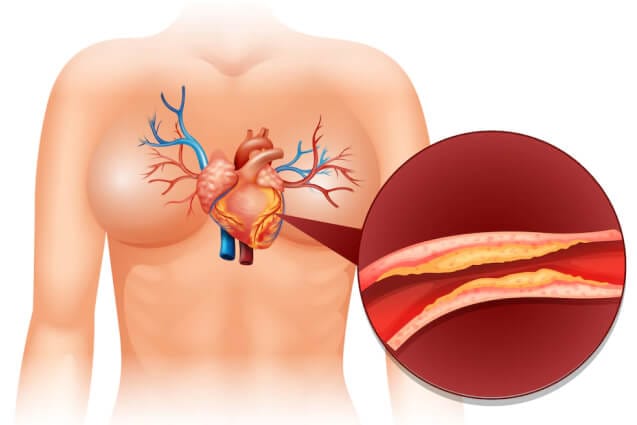Health Management
Importance of Health Management
High Cholesterol
High blood cholesterol is a condition that causes the levels of certain bad fats, or lipids, to be too high in the blood. This condition is usually caused by lifestyle factors, such as diet, in combination with the genes that you inherit from your parents. High cholesterol does not happen overnight. The build-up occurs over the course of several years. So, the importance of making smart health choices needs to start early in life! Your weight, diet, lifestyle, exercise & genetics all play a significant role, so regulating these can help you lower bad cholesterol.
We at WOMB WEIGHT MANANAGEMENT INSTITUTE helps you to regulate the cholesterol levels to keep your heart healthy.
You may be diagnosed with high blood cholesterol if you consistently have high levels of bad cholesterol in your blood in a routine test called a lipid panel. To treat high blood cholesterol, your doctor may recommend heart-healthy lifestyle changes, such as heart-healthy eating, quitting smoking, or aiming for a healthy weight.

Thyroid
The thyroid gland is a butterfly-shaped organ located in the base of your neck. It releases hormones that control metabolism—the way your body uses energy. The thyroid’s hormones regulate vital body functions, including:
- Breathing
- Heart rate
- Central and peripheral nervous systems
- Body weight
- Muscle strength
- Menstrual cycles
- Body temperature
- Cholesterol levels

2c. PCOS (Polycystic Ovary Syndrome)
Polycystic ovary syndrome (PCOS) is a hormonal disorder common among women of reproductive age. Women with PCOS may have infrequent or prolonged menstrual periods or excess male hormone (androgen) levels. The ovaries may develop numerous small collections of fluid (follicles) and fail to regularly release eggs.
The exact cause of PCOS is unknown. Early diagnosis and treatment along with weight loss may reduce the risk of long-term complications such as type 2 diabetes and heart disease.
Symptoms
Signs and symptoms of PCOS often develop around the time of the first menstrual period during puberty. Sometimes PCOS develops later, for example, in response to substantial weight gain.
Signs and symptoms of PCOS vary. A diagnosis of PCOS is made when you experience at least two of these signs:
- Irregular periods: Infrequent, irregular, or prolonged menstrual cycles are the most common sign of PCOS. For example, you might have fewer than nine periods a year, more than 35 days between periods, and abnormally heavy periods.
- Excess androgen: Elevated levels of male hormone may result in physical signs, such as excess facial and body hair (hirsutism), and occasionally severe acne and male-pattern baldness.
- Polycystic ovaries: Your ovaries might be enlarged and contain follicles that surround the eggs. As a result, the ovaries might fail to function regularly.
PCOS signs and symptoms are typically more severe if you’re obese.
Causes
The exact cause of PCOS isn’t known. Factors that might play a role include:
- Excess insulin: Insulin is the hormone produced in the pancreas that allows cells to use sugar, your body’s primary energy supply. If your cells become resistant to the action of insulin, then your blood sugar levels can rise and your body might produce more insulin. Excess insulin might increase androgen production, causing difficulty with ovulation.
- Low-grade inflammation: This term is used to describe white blood cells’ production of substances to fight infection. Research has shown that women with PCOS have a type of low-grade inflammation that stimulates polycystic ovaries to produce androgens, which can lead to heart and blood vessel problems.
- Research suggests that certain genes might be linked to PCOS.
- Excess androgen: The ovaries produce abnormally high levels of androgen, resulting in hirsutism and acne.
Complications
Complications of PCOS can include:
- Infertility
- Gestational diabetes or pregnancy-induced high blood pressure
- Miscarriage or premature birth
- Non-alcoholic state hepatitis — a severe liver inflammation caused by fat accumulation in the liver
- Metabolic syndrome — a cluster of conditions including high blood pressure, high blood sugar, and abnormal cholesterol or triglyceride levels that significantly increase your risk of cardiovascular disease
- Type 2 diabetes or prediabetes
- Sleep apnea
- Depression, anxiety, and eating disorders
- Abnormal uterine bleeding
- Cancer of the uterine lining (endometrial cancer)
Obesity is associated with PCOS and can worsen complications of the disorder.
Menopause
Menopause is the time that marks the end of your menstrual cycles. It’s diagnosed after you’ve gone 12 months without a menstrual period. Menopause can happen in your 40s or 50s, but the average age is 51 in the India.
Menopause is a natural biological process. But the physical symptoms, such as hot flashes, and emotional symptoms of menopause may disrupt your sleep, lower your energy or affect emotional health. There are many effective treatments available, from lifestyle adjustments to hormone therapy.

Vitamin Deficiency
Every day, your body produces skin, muscle, and bone. It churns out rich red blood that carries nutrients and oxygen to remote outposts, and it sends nerve signals skipping along thousands of miles of brain and body pathways. It also formulates chemical messengers that shuttle from one organ to another, issuing the instructions that help sustain your life.
But to do all this, your body requires some raw materials. These include at least 30 vitamins, minerals, and dietary components that your body needs but cannot manufacture on its own in sufficient amounts.
Vitamins and minerals are considered essential nutrients—because acting in concert, they perform hundreds of roles in the body. They help shore up bones, heal wounds, and bolster your immune system. They also convert food into energy, and repair cellular damage.
Vitamins and minerals are often called micronutrients because your body needs only tiny amounts of them. Yet failing to get even those small quantities virtually guarantees disease

Insulin Resistance

This leads to reduced amounts of sugar in the blood, and puts it where it is intended to go, into the cells for use or storage. This is important, because high amounts of sugar in the blood can have toxic effects, causing severe harm and potentially leading to death if untreated. However, due to various reasons (discussed below), sometimes the cells stop responding to the insulin like they are supposed to. In other words, they become “resistant” to the insulin.
When this happens, the pancreas start producing even more insulin to bring the blood sugar levels down. This leads to high insulin levels in the blood, termed hyperinsulinemia. This may continue to develop for a long time. The cells become increasingly more insulin resistant, and both insulin and blood sugar levels go up. Eventually, the pancreas may not be able to keep up anymore and the cells in the pancreas may become damaged. This leads to decreased insulin production, so now there are low amounts of insulin cells that don’t respond to the little insulin that is available. This can lead to skyrocketing blood sugar levels.
When blood sugar levels exceed a certain threshold, a diagnosis of type 2 diabetes is made. In fact, this is a simplified version of how type 2 diabetes develops. Insulin resistance is the cause of this common disease that affects about 9% of people worldwide.
Pregnancy and Lactation
Pregnancy is a demanding physiological state. In India, it is observed that diets of women from the low socioeconomic groups are essentially similar during pre-pregnant, pregnant and lactating periods. Consequently, there is widespread maternal malnutrition leading to high prevalence of low birth weight infants and very high maternal mortality. Additional foods are required to improve weight gain in pregnancy (10-12 Kg) and birth weight of infants (about 3 Kg). It is hence important to ensure provision of extra food and healthcare to pregnant and lactating women.
Importance of nutrition in pregnancy lactation
- Eat more food during pregnancy.
- Eat more whole grains, sprouted grams, and fermented foods.
- Take milk/meat/eggs in adequate amounts.
- Eat plenty of vegetables and fruits.
- Avoid superstitions and food taboos.
- Do not use alcohol and tobacco. Take medicines only when prescribed.
- Take iron, folate, and calcium supplements regularly, after 14-16 weeks of pregnancy, and continue the same during lactation.
Ways to meet the nutritional demands during pregnancy and lactation
- The pregnant/lactating woman should eat a wide variety of foods to make sure that her own nutritional needs, as well as those of her growing fetus are met.
- There is no particular need to modify the usual dietary pattern. However, the quantity and frequency of usage of the different foods should be increased.
- She can derive the maximum amount of energy (about 60%) from rice, wheat, and millets. Cooking oil is a concentrated source of both energy and polyunsaturated fatty acids.
- Good quality protein is derived from milk, fish, meat, poultry, and eggs. However, a proper combination of cereals, pulses, and nuts also provides adequate proteins.
- Mineral and vitamin requirements are met by consuming a variety of seasonal vegetables particularly green leafy vegetables, milk, and fresh fruits.
- The bioavailability of iron can be improved by using fermented and sprouted grams and foods rich in vitamin C such as citrus fruits.
- Milk is the best source of biologically available calcium.
- Though it is possible to meet the requirements for most of the nutrients through a balanced diet, pregnant/lactating women are advised to take daily supplements of iron, folic acid, vitamin B, and calcium.
For More Information or to Get Started on Your Journey Today
Contact Us Online or Give Us a Call

